New Uzbekistan: human rights and parliamentary elections  A.Kh. Saidov,
A.Kh. Saidov,
First Deputy Speaker of the Legislative Chamber of the Oliy Majlis of the Republic of Uzbekistan, Director of the National Center of the Republic of Uzbekistan for Human Rights
The modern economic and democratic systems are designed to uphold the rights and freedoms of every individual. As is widely acknowledged, there is no universal model for democratic development; it must evolve based on each country's unique conditions and the needs of its people, avoiding rigid formulas. READ MORE
What does Azerbaijan’s “shift to the East” mean for the South Caucasus?  By Yeghia TASHJIAN, Beirut-based regional analyst and researcher, columnist, "The Armenian Weekly” By Yeghia TASHJIAN, Beirut-based regional analyst and researcher, columnist, "The Armenian Weekly”
On August 29, 2023, in my article “What does the expansion of BRICS mean for the South Caucasus?” I argued that Iran’s accession to BRICS and the integration of the region’s infrastructure into the International North-South Transport Corridor (INSTC) would similarly increase pressure on Armenia and Azerbaijan to join the bloc. The post-2020 regional status quo and the war in Ukraine have opened the path for new Eurasian actors such as India and China to exert their influence on the South Caucasus. Azerbaijan is the main beneficiary of this development. Positioned strategically along the North-South and East-West transport corridors, Baku has capitalized on its position to become a pivotal transportation and logistics hub in Eurasia. This has caught the attention of China amid the geopolitical shifts that took place in the South Caucasus in light of the second Artsakh (Nagorno-Karabakh) and Ukraine wars.
READ MORE
- September 13, 2024 08:15AM
New powers of the parliament of the New Uzbekistan  Akilov Alimjon Rakhimovich, Akilov Alimjon Rakhimovich,
Chief Researcher of Department of analyzing the effectiveness of constitutional construction and public administration of Institute of Legislation and Legal Policy under the President of the Republic of Uzbekistan, doctor of legal sciences, professor
The year 2016 for Uzbekistan was marked by the beginning of a fundamentally new in essence and content stage of state and social construction, in which the main strategic goal was proclaimed - the construction of a New Uzbekistan, based on the values that served the greatest flourishing of our statehood in the 9th-10th centuries (known in world history as First Eastern Renaissance) and XIV-XV centuries (Second Eastern Renaissance). As in previous periods, the basis and priorities of the Third Renaissance of our statehood are the development of science and modern technologies, which are intended to become drivers of dramatic development of the country’s economy, a radical improvement in the well-being of the people and the prosperity of the nation. READ MORE
Uzbekistan’s renewed electoral system a key factor in the advancement of representative democracy  Shuhrat Bafayev, Shuhrat Bafayev,
Chairman of the Committee for Democratic Institutions, Nongovernmental Organizations and Citizens’ Self-Government Bodies, Legislative Chamber of the Oliy Majlis of the Republic of Uzbekistan
Over the years of independent development Uzbekistan firmly guided by the principles of universal, equal and direct suffrage in secret voting, has progressively implemented international electoral standards into its electoral legislation. In 2017, in his first Address to the Parliament, the President of Uzbekistan Shavkat Mirziyoyev suggested that the current national electoral legislation does not ensure its harmonization and proposed to develop an Electoral Code that meets international norms and standards. Thus, the Electoral Code was adopted in 2019, incorporating more than 30 new democratic norms for organizing and conducting election processes. The approval of the Code marked the dawn of a new stage in the development of representative democracy in the country. READ MORE
The awakening lion: the era of renewal 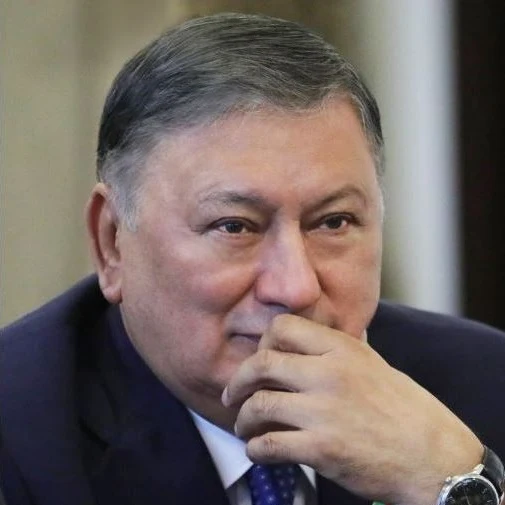 Hey, great Turan, land of lions! Hey, great Turan, land of lions!
What has become of you? What are these days you endure now?
Oh, glorious cradle of Genghis, Timur, Oghuz, and Attila!
Where have the esteemed seats you once held gone?..
Abdurauf Fitrat
An American politician once said of the current life and fate of the Central Asian region: ‘They are neither post-Soviet nor post-communist countries now’.
Today no specialist knowledge is needed to understand this idea, which suggests that such labels are outdated in the research community. For example, ten to fifteen years ago the political behaviour of Central Asian societies – neighbours for thousands of years – was prone to national separatism, mutual dislike and latent hostility, but today they have undergone a remarkable transformation. Ideologues and ordinary Central Asians only a couple years ago endeavoured to prove their superiority, their antiquity and, for these very reasons, their greater belonging to the historical and cultural heritage of the region. Though they still might hurl some sharp insults at each other, now they have become united neighbours.
READ MORE
CERR: IMF Estimates Uzbekistan's GDP at $101.6 Billion  According to the IMF's assessment, the nominal GDP of the Republic of Uzbekistan in 2023 increased by 125.6 trillion sums ($10.7 billion) and amounted to 1,192.2 trillion sums ($101.6 billion). According to the IMF's assessment, the nominal GDP of the Republic of Uzbekistan in 2023 increased by 125.6 trillion sums ($10.7 billion) and amounted to 1,192.2 trillion sums ($101.6 billion).
CERR hosted a discussion among experts and academics regarding a study conducted by the Statistics Agency in collaboration with the IMF. The primary goal of this study was to assess the size of the unobserved economy in Uzbekistan and examine its impact on other macroeconomic indicators. READ MORE
What drives Azerbaijani obsession with the Armenian Constitution?  By Benyamin POGHOSYAN, PhD, Chairman, Center for Political and Economic Strategic Studies By Benyamin POGHOSYAN, PhD, Chairman, Center for Political and Economic Strategic Studies
Since the end of the Second Nagorno-Karabakh War in 2020, Armenia and Azerbaijan have been engaged in negotiations to sign a peace agreement. The process seems like a roller coaster of extreme ups and downs, reflecting the volatile and unpredictable nature of the discussions. Several times, the sides have seemed close to reaching a deal only for an unexpected circumstance to arise, causing a significant reversal during the peace talks. In late 2022, after intensive negotiations in Washington and Prague, Azerbaijan refused to appear in Brussels and instead launched a blockade of the self-proclaimed Nagorno-Karabakh Republic. Azerbaijan did the same at the end of 2023, when despite mounting hopes for an imminent agreement President Aliyev refused to attend the European Political Community (EPC) summit in October 2023 in Granada and the trilateral Armenia–Azerbaijan–European Union summit in Brussels.
READ MORE
Uzbekistan plans to increase exports of electrical products to Europe, countries of South Asia and the Middle East 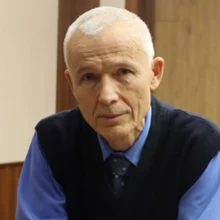 Yuri Kutbitdinov, Yuri Kutbitdinov,
chief Research Officer of the Center for Economic Research and Reforms under the Administration of the President of the
Republic of Uzbekistan
There are about a thousand manufacturing enterprises operating in the electrical engineering sector of Uzbekistan, most of them small, producing over two thousand types of products. Almost all enterprises in the industry are privately owned. The total number of people employed in the industry exceeds 35,000.
The 76 largest enterprises in the industry, which produce over 90% of all electrical engineering products, are members of the Association of Electrical Engineering Manufacturers (UzEltechSanoat). Of these, 18 enterprises manufacture electrical wires and cables, 27 enterprises manufacture household appliances, and 32 enterprises manufacture power transformers and other electrical products.
READ MORE
Human dignity and the benefits of the people in New Uzbekistan – high values  Khudoyberdi Khaknazarov Khudoyberdi Khaknazarov
Doctor of History
It is not an exaggeration to say that in the historical conditions where humanity is going through a difficult period, where contradictions and conflicts are intensifying and seriously undermining stability, in the multi-ethnic New Uzbekistan, human dignity and the interests of the people are recognized as the highest values, and in this regard, it is becoming an example and model for many countries of the world.
Because sustainable development can be achieved first of all by valuing and honoring people, creating conditions for the population to live well today, and realizing the high trust and responsibility of the population for the future.
READ MORE
Uzbekistan: A Course for Continuing Intensive Reforms in Youth Policy  Bekzod Jurabayev Bekzod Jurabayev
Chief scientific researcher of the Institute of Legislation and Legal Policy under the President of the Republic of Uzbekistan, Chairman of the Council of Young Scientists of the Institute
Uzbekistan is a country of youth. According to statistical data, about 60% of Uzbekistan's population is under the age of 30. Thus, over 18 million residents of Uzbekistan are young people, and by 2040 this number could reach 25 million. This creates unique opportunities and specific challenges for the state in terms of providing education, employment, and social integration for the youth. On February 21 of this year, a Presidential Decree approved the State Program for the implementation of the "Uzbekistan - 2030" Strategy in the Year of Support for Youth and Business. It outlines a number of tasks aimed at addressing the problems faced by young people and realizing their potential.
READ MORE
Armenia’s European aspirations 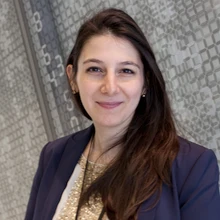  By Anahide PILIBOSSIAN, Vice President of Strategy and Development, APRI Armenia By Anahide PILIBOSSIAN, Vice President of Strategy and Development, APRI Armenia
Benyamin POGHOSYAN, PhD, Chairman, Center for Political and Economic Strategic Studies
Despite economic challenges and existing agreements with the Eurasian Economic Union, Armenia seeks closer alignment with the EU.
The recent statement of the Armenian Foreign Minister in the margins of the Antalya Diplomatic Forum denotes Armenia’s desire to join the European Union. This aspiration raises important questions on Armenia’s current position and options, which this article seeks to shed light on. At the same time, today’s complicated geopolitical environment highlights the need for the EU to formulate a strategic vision for the region. Between Pax Europa and Pax Russica, Armenia first went with the latter. However, following Yerevan’s defeat in the second Nagorno-Karabakh War and the military takeover of the region by Azerbaijan, despite the presence of the Russian peacekeepers, Armenia has now opted for the former. It stated its desire, backed by the EU, to join the Black Sea energy cable project (from which it has been excluded, reportedly as a result of pressures from Azerbaijan) and promote a regional infrastructure and connectivity project called the Crossroad of Peace, embracing, as European leaders did after World War II, the peace-building effects of economic regional integration projects.
READ MORE
What does the India-Iran Chabahar port deal mean for Armenia?  By Yeghia TASHJIAN, Beirut-based regional analyst and researcher, columnist, "The Armenian Weekly” By Yeghia TASHJIAN, Beirut-based regional analyst and researcher, columnist, "The Armenian Weekly”
On May 13, 2024, Iran and India signed a historic deal under which New Delhi was granted the right to develop and operate the Iranian port of Chabahar on the Gulf of Oman. India has been eying this port for the past two decades to export goods to Iran, Afghanistan and Central Asian countries and bypass the Chinese-developed ports of Gwadar and Karachi in Pakistan. Commenting on the deal after the signing ceremony in Tehran, India’s Shipping Minister Sarbananda Sonowal said, “Chabahar Port’s significance transcends its role as a mere conduit between India and Iran; it serves as a vital trade artery connecting India with Afghanistan and Central Asian Countries.” Under this agreement, the Indian Ports Global Limited (IPGL) company will invest $120 million in the port with an additional $250 million in financing. Within this context, Indian Foreign Minister Subrahmanyam Jaishankar told reporters in Mumbai that this deal will open the path for new, larger investments to be made in the port.
READ MORE
Uzbekistan: the fight against corruption is a continuous process  Nilufar Doniyorkhodjaeva, Nilufar Doniyorkhodjaeva,
Head of Department Development Strategy Center,
Tashkent, Uzbekistan
Uzbekistan has been undergoing a transformational journey since it changed political leadership in 2016. The nation is implementing extensive reforms aimed at spanning anti-corruption measures, business climate enhancements, judicial reforms, improving labour conditions, administrative efficiency, protection of human rights, and good governance.
READ MORE
The anatomy of the current protests in Armenia  By Benyamin POGHOSYAN, PhD, Chairman, Center for Political and Economic Strategic Studies By Benyamin POGHOSYAN, PhD, Chairman, Center for Political and Economic Strategic Studies
Armenia is still absorbing the implications of the protests that overwhelmed Yerevan on May 9. On April 19, 2024, the Armenian and Azerbaijani border delimitation and demarcation commissions signed the protocol on the delimitation and demarcation process in the Tavush region of Armenia. That agreement granted Azerbaijan control over a patch of territory along that border that had been officially part of Soviet Azerbaijan but controlled by Armenia since the dissolution of the Soviet Union in 1991. The movement “Tavush for the Motherland” started with the closure of the Armenia-Georgia interstate highway near the village of Kirants in the Tavush region, one of the villages that was going to be affected by the process. Later, it transformed into a march towards Yerevan. Protestors led by Tavush Archbishop Bagrat reached Yerevan on May 9, 2024, and at a rally asked for Prime Minister Pashinyan's resignation. The rally was followed by several rallies in Yerevan in the last two weeks, sometimes accompanied by clashes with police.
READ MORE
The alternative scenarios facing the South Caucasus  By Benyamin POGHOSYAN, PhD, Chairman, Center for Political and Economic Strategic Studies By Benyamin POGHOSYAN, PhD, Chairman, Center for Political and Economic Strategic Studies
As the global order continues to morph into a more complex architecture with an array of global and regional powers, the geopolitical future of the South Caucasus hangs in the balance. The tectonic changes in the region of the last four years – the 2020 Nagorno-Karabakh war, the regional implications of the Russian invasion of Ukraine, the military takeover of Nagorno-Karabakh by Azerbaijan, and forced displacement of Armenians, the EU candidate status for Georgia and Georgia’s quest for multi-vector foreign policy including the establishment of strategic partnership with China, the limbo in Armenia–Azerbaijan negotiations, growing assertiveness of Azerbaijan and eventual move of Armenia towards closer cooperation with the EU and the US – all make the situation quite complex.
READ MORE
Trans-Afghan corridor: Uzbekistan's initiative serves the development of a larger region  Yu. Imomova Yu. Imomova
Research fellow
Institute for Prospective International Studies
Under UWED
In recent years, the main principle of the foreign policy of the Republic of Uzbekistan has been the establishment of good neighborly relations, in particular, strengthening economic ties with Afghanistan, providing comprehensive assistance in preventing a humanitarian crisis in this country, implementing the Trans-Afghan railway project, cooperating on the Kosh-Tepa canal project, and other issues. Evidence supporting this perspective is the strategic focus of the Republic of Uzbekistan's development plan for 2022-2026, which emphasizes fostering comprehensive relations with Afghanistan and aiding its socio-economic revitalization.
READ MORE
Representative of Uzbekistan elected to UN Human Rights Committee for the first time in history  On May 29, at the UN headquarters in New York, during the 40th session of the states parties to the International Covenant on Civil and Political Rights (ICCPR), elections were held for nine members of the Human Rights Committee (HRC) for the 2025-2028 term. On May 29, at the UN headquarters in New York, during the 40th session of the states parties to the International Covenant on Civil and Political Rights (ICCPR), elections were held for nine members of the Human Rights Committee (HRC) for the 2025-2028 term.
Representatives from 16 states, including Burundi, Georgia, Egypt, India, Spain, Cameroon, Côte d'Ivoire, Lithuania, Morocco, Paraguay, the Republic of Korea, North Macedonia, Togo, Uzbekistan, Croatia, Ethiopia, and South Africa, competed for the nine seats in the HRC.
READ MORE
Border readjustment in Tavush, what’s next?  By Yeghia TASHJIAN, Beirut-based regional analyst and researcher, columnist, "The Armenian Weekly” By Yeghia TASHJIAN, Beirut-based regional analyst and researcher, columnist, "The Armenian Weekly”
On April 17, 2024, Armenia’s Prime Minister Nikol Pashinyan, at a meeting with the residents of Kirants village in the Tavush region, said that for the past 30 years, the residents have lived “in the conditions of lawlessness, and the time has come to put an end to this, to establish a rule of law” in the region. The PM added: “Our idea is for you not to say Azerbaijan is 50 meters away, but to say, wow, it is good that Azerbaijan is 50 meters away. We will trade there. We will build the economy there. Maybe we will build another checkpoint. Cars will come and go and pay the Republic of Armenia.” He later continued: “Now you can say to me: Do you 100-percent guarantee that you will do this? I will answer, I don’t guarantee 100-percent, but I know that by taking step by step, we will reach 90-percent or even more.” Azerbaijan insists that there are four bordering villages near Armenia’s Tavush and Azerbaijan’s Qazax region that must be ceded to Azerbaijan. Baku argues that these villages were taken by Armenian forces in the early 1990s.”
READ MORE
The Role of Foreign Actors in the Armenia-Azerbaijan Conflict 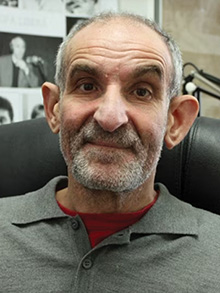 By Eugene KOGAN, Tbilisi-based defence and security expert By Eugene KOGAN, Tbilisi-based defence and security expert
This AIES Focus discusses the four major foreign actors in the conflict between Armenia and Azerbaijan within the time frame of the last 12 to 18 months. While Russia and Turkey are active and directly involved, China and India are implicitly but not explicitly involved in the conflict. As a result, the author tries to present and highlight the divergent and convergent perspectives of the foreign actors in the conflict. One of the major focal points of the conflict relates to what the Azerbaijani call the Zangezur corridor, and the Armenians perceive as a bone of contention. What is perhaps not least important to emphasise is that for Ilham Aliyev, the President of Azerbaijan, the corridor has a crucial role in the transportation link between Turkey, Azerbaijan and the Turkic States. As for Armenia and Iran, its neighbouring country, the establishment of such a corridor is perceived as an existential threat. READ MORE
Yerevan’s ‘Crossroads for Peace’ Remains Elusive  By Vasif HUSEYNOV, PhD, Head of Department, AIR Center, Adjunct Lecturer, ADA and Khazar Universities, Baku By Vasif HUSEYNOV, PhD, Head of Department, AIR Center, Adjunct Lecturer, ADA and Khazar Universities, Baku
On April 5, European Commission President Ursula von der Leyen and US Secretary of State Antony Blinken expressed support for the “Crossroads for Peace” project of Armenian Prime Minister Nikol Pashinyan during a press conference before their meeting in Brussels. The project, which was presented to the public during the Armenian premier’s address at the Fourth Silk Road Forum in Tbilisi on October 26, 2023, envisions opening new transportation routes across Armenia with the hopes of transforming the country into a regional transit hub. The project calls for the opening of connections between Azerbaijan and Türkiye via Armenian territory and aims to incorporate these links into east-west trade along the Middle Corridor. Neither Baku nor Ankara, however, has been consulted or declared any support for the initiative. Thus, Pashinyan’s project remains “on paper,” and failure to work directly with the Azerbaijan and Turkish governments may mean the idea never comes to fruition.
READ MORE
Tashkent will host the first meeting of Central Asia Regional Expert Council in Rehabilitation and Reintegration of Returnees 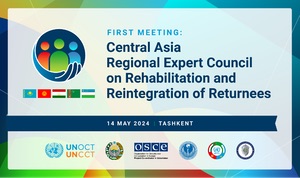 Tashkent/New York/Vienna, May 10, 2024. Tashkent/New York/Vienna, May 10, 2024.
On May 14 this year, the first meeting of Central Asia Regional Expert Council in Rehabilitation and Reintegration of Returnees from armed conflict zones will be held in Tashkent.
The Regional Expert Council is being established on the initiative of the President of Uzbekistan, Mr. Shavkat Mirziyoyev, put forward in March 2022 in Tashkent at the high-level conference “Regional cooperation of the countries of Central Asia under the Joint Action Plan for the implementation UN Global Counter-Terrorism Strategy” and supported by international partners.
READ MORE
Central Asian countries and the Gulf Cooperation Council: synergy of potentials  Uzbekistan, and Tashkent in particular, is becoming the venue for an important international forum that should give a practical vector to a new format of interregional cooperation based on the traditions of centuries-old exchanges between the peoples of Central Asia and the Arab States of the Gulf and today's huge potential for mutually beneficial co-operation. Uzbekistan, and Tashkent in particular, is becoming the venue for an important international forum that should give a practical vector to a new format of interregional cooperation based on the traditions of centuries-old exchanges between the peoples of Central Asia and the Arab States of the Gulf and today's huge potential for mutually beneficial co-operation.
The first ministerial meeting of the Gulf Cooperation Council-Central Asia Strategic Dialogue was held on 7 September 2022 in Riyadh, the capital of Saudi Arabia.
READ MORE
Beyond a warning message from Tehran  By Yeghia TASHJIAN, Beirut-based regional analyst and researcher, columnist, "The Armenian Weekly” By Yeghia TASHJIAN, Beirut-based regional analyst and researcher, columnist, "The Armenian Weekly”
Amid increasing tensions between Russia and Armenia, and Azerbaijan’s growing pressure on Armenia to annex new border villages, the first week of March was characterized by intensive official Armenian- Iranian meetings. What is the nature of these meetings? Is there any coincidence with the timing? And what can Iran do to defuse tensions between Yerevan and Moscow?
On March 6, 2024, a delegation headed by Armenia’s Defence Minister Suren Papikyan visited Iran and met with Iranian officials. In Papikyan’s meeting with his Iranian counterpart Brigadier General Mohammad-Reza Ashtiani, the Iranian minister reaffirmed his country’s position supporting Armenia’s territorial integrity and national sovereignty over its entire territory and opposing a change in internationally recognized borders in the region. He also expressed support for direct negotiations between Yerevan and Baku that aim “to bring peace and security to the region.” However, Ashtiani warned that the pursuit of security from outside the region would backfire and create instability, adding “The architecture of regional security must be formed in the region itself, otherwise it will become a battlefield for major powers.”
READ MORE
Uzbekistan will gather folklorists and expect tourists from all over the world in May  On 1-7 May, the ancient and unique land of Surkhandarya will host the traditional international “Boysun Bakhori” (Baysun Spring) folklore festival On 1-7 May, the ancient and unique land of Surkhandarya will host the traditional international “Boysun Bakhori” (Baysun Spring) folklore festival
Preparations for the festival, which will unite bearers, performers and masters of folklore and ethnographic art from all over the world, are being carried out in a completely new spirit. In the modern tourist complex in Bibishirin mahalla, where its main events will take place, all conditions are being created for performances of folklore and ethnographic groups, national sports games and other various performances.
READ MORE
|
|